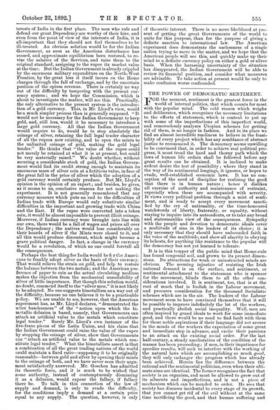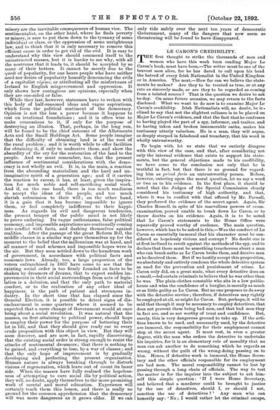THE POWER OF DEMOCRATIC SENTIMENT. F OR the moment, sentiment is
the greatest force in the world of internal politics, that which counts for most with the popular mind. The cold reason which weighs and deliberates, which recognises the necessary limitations to the efforts of statesmen, which is content to put up with some of the imperfections of this imperfect world, and remorselessly analyses Utopian schemes for getting rid of them, is no longer in fashion. And. in its place we find an almost incredible readiness to believe in the feu& bility of every project which has any semblance of abstract justice to recommend it. The democracy seems unwilling to be convinced that, in order to achieve real political pro- gress, it must tread the hard and thorny path which the laws of human life ordain shall be followed before any great results can be obtained. It is inclined to make ardent desire the test of possibility ; where they stand in the way of its sentimental longings, it ignores, or hopes to evade, well-established economic laws. It has no con- ception of the need of discipline for realising the good that there is in human nature ; hence it dislikes all exercise of authority and maintenance of restraint, especially when these are accompanied with severity. It views every political problem through a mist of senti- ment, and is ready to accept every movement sancti- fied by the cry of nationality, or the time-honoured watchwords of liberty, fraternity, or equality, without staying to inquire into its antecedents, or to take any broad and statesmanlike view of the consequences. Sympathy with the people and devotion to democratic ideals cover a multitude of sins in the leaders of its choice ; it is only necessary that they should have unbounded faith in the voice of the multitude, and show all alacrity in obeying its behests, for anything like resistance to the popular will the democracy has not yet learned to tolerate.
It is in this temper of the public mind that Home-rule has found congenial soil, and grown to its present dimen- sions. Its attractions for weak or uninstructed minds are obvious. The seeming injustice of resisting the Irish national demand is on the surface, and sentiment, or sentimental attachment to the statesman who is sponsor for the movement, blinds them to all the other con- siderations involved. It is sentiment, too, that is at the root of much that is foolish in the Labour movement, and procures consideration for the thousand Socialistic schemes which are in the air. The leaders of the Labour movement seem to have convinced themselves that it will be possible to improve indefinitely the lot of the workers, and practically abolish social inequality. Well, men are often inspired by grand ideals to work for some immediate good, and there would be no need. to find fault with them for these noble aspirations if their language did not arouse in the minds of the workers the expectation of some great and immediate step in advance, and excite their passions to an attack on the existing social order. For the last half-century, a steady amelioration of the condition of the masses has been proceeding ; if men, in their impatience for speedier results, will seek to interfere with the working of the natural laws which are accomplishing so much good, they will only endanger the progress which has already been achieved. Herein lies the difference between the rational and the sentimental politician, even when their ulti- mate aims are identical. The former recognises the fact that society is an organism, and must be allowed to grow out of its ailments and imperfections, and is not a piece of mechanism which can be mended to order. He sees that society has diseases incidental to every stage of its growth, that you cannot get rid of the evil without at the same time sacrificing the good, and that human suffering and misery are the inevitable consequences of human vice. The sentimentalist, on the other hand, where he finds poverty or misery, is sure to put them down to the tyranny of some individual or class, or the oppression of some unrighteous law, and to think that it is only necessary to remove this efficient cause in order to get rid of the evil. It is easy to understand why this view should commend itself to the uninstructed masses, but it is harder to see why, with all the nostrums that it leads to, it should be accepted by so many of their betters. It cannot be merely due to the quest of popularity, for one hears people who have neither need nor desire of popularity honestly denouncing the evils of a capitalist regime, or attributing all the misfortunes of Ireland to English misgovernment and oppression. It only shows how contagious are opinions, especially when they are one-sided or false.
While they last, however, statesmen have to reckon with this body of half-reasoned ideas and vague aspirations, which form the political sentiment of the democracy. Opinion is not the less a power because it happens to rest on irrational foundations ; and it is often wise to make concessions to it, if only for the purpose of destroying an illusion. That, perhaps, in the long run, will be found to be the chief outcome of the Allotments Acts and the Small Holdings Act. Some people imagine that the difficulty of obtaining land is at the root of the rural problem ; and it is worth while to offer facilities for obtaining it, if only to undeceive them, and show the absurdity of the cry for the restoration of the land to the people. And we must remember, too, that the present influence of sentimental considerations with the demo- cracy is not wholly an evil. It is, in the main, a reaction from the abounding materialism: and the hard and un- imaginative spirit of a generation ago ; and if it carries the reaction to excess, it has, at least, given the inspira- tion for much noble and self-sacrificing social work. And if, on the one hand, there is too much readiness to accept the ideas of the people, and too much slavish submission to their will ; on the other hand, it is a gain that it has become impossible to ignore them, or feel completely indifferent to their happi- ness. As regards its evil and dangerous tendencies, the present temper of the public mind is not likely to prove enduring. Its vague enthusiasms, false political economy, and impossible aspirations are continually coming into conflict with facts, and dashing themselves against realities. After the passage of the great Reform Bill, the middle classes in a similar way gave themselves up for the moment to the belief that the millennium was at hand, and all manner of mad schemes and impossible hopes were in the air. But they soon settled down to the humdrum work of government, in accordance with political facts and economic laws. Already, too, a large proportion of the voters enfranchised in 1867 have come to see that the existing social order is too firmly founded on facts to be shaken by dreamers of dreams, that to expect sudden im- provements in their social surroundings from acts of legis- lation is a delusion, and that the only path to material comfort, or to the realisation of any other ideal of happiness, is the path of patient and strenuous in- dustry. In the short time that has elapsed since the General Election, it is possible to detect signs of dis- enchantment in some quarters where it seemed to be expected that a mere change of Government would at once bring about a social revolution. It was natural that the masses, on first attaining to political power, should hope to employ their power for the purpose of bettering their lot in life, and that they should give ready ear to every crude proposition with this object in view. But they will soon discover, and are now, in fact, rapidly discovering, that the existing social order is strong enough to resist the attacks of sentimental dreamers ; that there is nothing to be gained, and everything to lose, by a war of classes ; and that the only hope of improvement is by gradually developing and perfecting the present organisation. Human nature is always breaking through to disturb visions of regeneration, which leave out of count its baser side. When the masses have fully realised the hopeless- ness of attempting to cure social ills by political action, they will, no doubt, apply themselves to the more promising work of mental and moral education. Experience will certainly teach them this lesson, and there is really no ground for the common apprehension that the democracy will wax more dangerous as it grows older. If we can only tide safely over the next ten years of democratic Government, many of the dangers that now seem so threatening will be found to have disappeared.







































 Previous page
Previous page